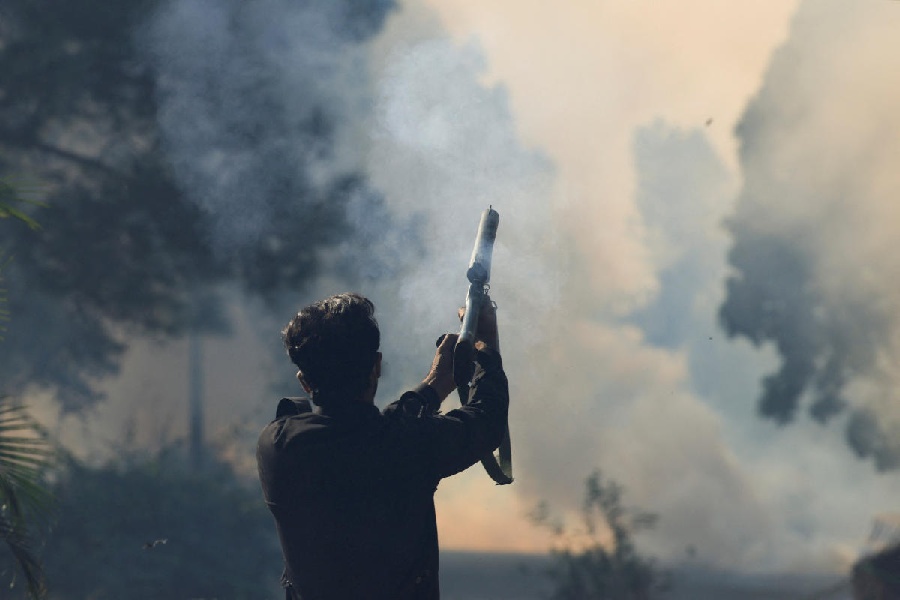Ten years have passed since Ajoon Khan’s son died in a ghastly attack by the Pakistani Taliban that killed about 150 people, mostly children, at a military-run school in Peshawar in northwestern Pakistan.
But the pain of loss is unrelenting — it grows only deeper with time. Khan, a lawyer, said he could never forget the parents sobbing and pleading outside the school gates, the soldiers storming the building, and the children and the teachers fleeing in terror.
“It has been nearly a decade, but it feels like nothing has changed,” said Khan, speaking last week, just before the December 16 anniversary of the death of his son, Asfand, who had been in the 10th grade. “If you look at the security situation in the country, it feels that our children’s sacrifices were in vain.”
The brutal assault on the school in Peshawar led to rare political unity in support of a comprehensive counterterrorism strategy for Pakistan and a vast military operation in the country’s former tribal areas near Afghanistan. The efforts forced militants to retreat across the border and brought a degree of relative peace to Pakistan. Large-scale terrorist attacks were significantly reduced, with fatalities dropping from 2,451 across 1,717 attacks in 2013 to 220 in 146 attacks in 2020.
But the hard-won gains from Pakistan’s counterinsurgency offensive — a costly endeavour in money and lives — are now in jeopardy.
Over the past few years, violence by the Pakistani Taliban and other Islamist militant groups has surged in parts of Khyber Pakhtunkhwa Province, in northwestern Pakistan. Experts attribute the increase to the Afghan Taliban’s seizure of power in neighbouring Afghanistan in August 2021.
Simultaneously, ethnic separatist groups in the southwestern province of Baluchistan have regained momentum, increasingly targeting security forces and Chinese nationals involved in projects under the Belt and Road Initiative, China’s infrastructure investment programme. The separatists accuse Pakistan’s government of allowing China to extract the region’s wealth.
Last week, the interior ministry reported that 924 people, including civilians and law enforcement personnel, had been killed in 1,566 terrorist attacks across the country over the past 10 months. The ministry said that 341 terrorists had been killed during the period. Most recently, an overnight attack on Friday in a former tribal district of Khyber Pakhtunkhwa province killed 16 people, most of them soldiers, according to The Khorasan Diary, an Islamabad-based research platform specialising in tracking militant activity.
Experts and security officials have identified a range of challenges impeding Pakistan’s progress against terrorism: political instability, weak governance, dwindling public support, economic constraints and reduced US counterterrorism assistance after the end of the 20-year war in Afghanistan.
The source of the problem for Pakistan, experts say, is mainly found across the border, in Afghanistan.
The Taliban administration in Kabul, the Afghan capital, denies accusations of harbouring militants from the Pakistani Taliban, also known as Tehrik-i-Taliban Pakistan, or T.T.P. But Asfandyar Mir, a senior expert at the US Institute of Peace, said that the T.T.P. had been given “a permissive safe haven in Afghanistan”, which had allowed it to become “resilient and lethal”.
Pakistani security officials privately acknowledged that they had misjudged how the new Taliban rulers of Afghanistan would handle the Pakistani Taliban. The officials had anticipated that the Taliban leaders in Afghanistan would help curb the T.T.P. in return for the covert support that Pakistan had provided them during the US-led war.
Instead, the Taliban in Kabul have provided the T.T.P. with resources and advanced American-made weapons and equipment seized after the collapse of the US-supported Afghan government, according to a senior security official in Islamabad who spoke on the condition of anonymity to discuss internal assessments.
The T.T.P. has gone on to unleash a wave of attacks inside Pakistan as it wages a campaign whose aim is to overthrow the government.
New York Times News Service










